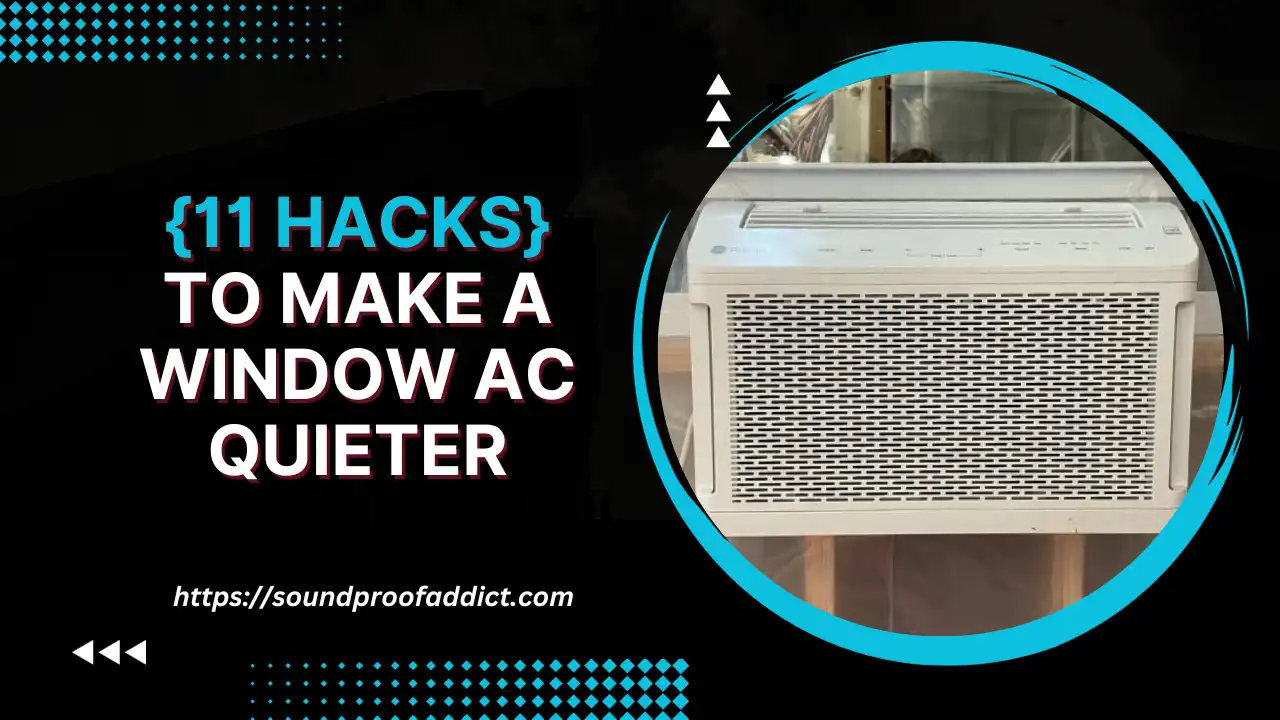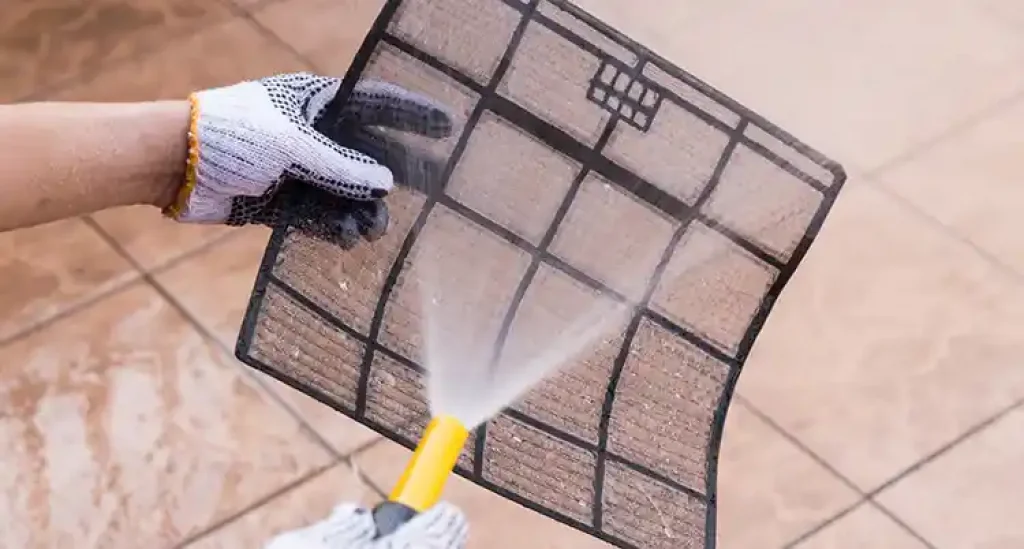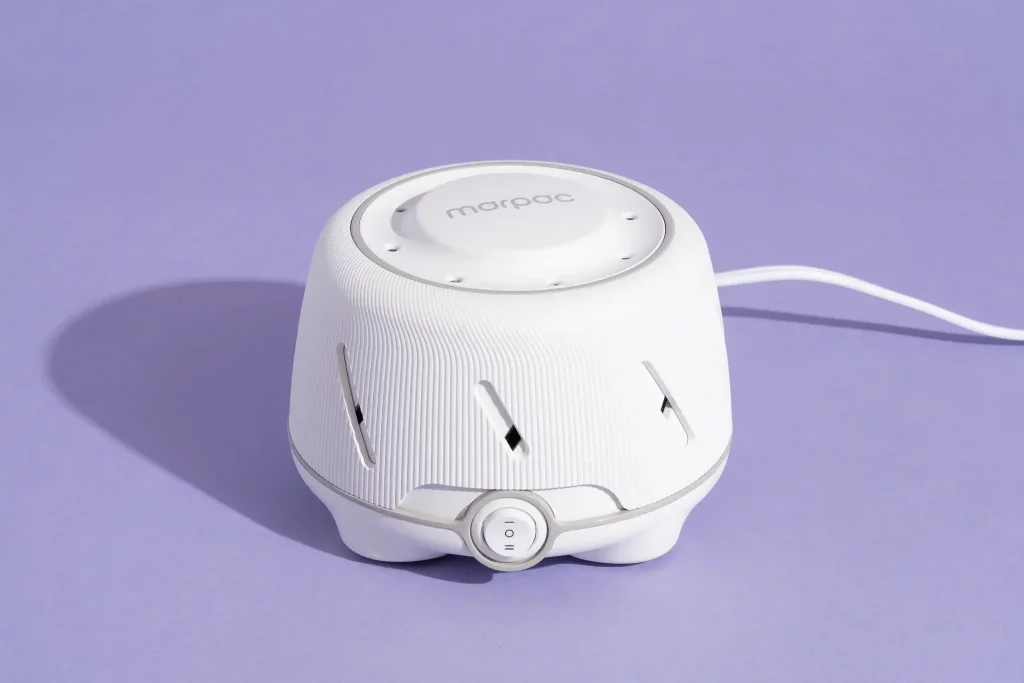{11 Hacks} To Quiet a Noisy Window Air Conditioner

Are you wondering: “Why is my window air conditioner making so much noise?” If so, you are not alone facing this issue.
Last year (2022), our team repaired over 1,000 air conditioning units, with 33% of them being noisy. So don’t worry, it is normal.
A noisy window air conditioner can be frustrating and it can be really hard to figure out what the root cause is to troubleshoot it and make it operate quiet again.
But to make it easier for you, and to help you quiet your noisy window air conditioner. We have brought up the 9 common causes of a noisy window air conditioner, so you can fix these issues and make it quieter. Let’s dive in:
Why your window air conditioner making noise? 9 Causes
Identifying what the causes is and fixing it is really what it to quiet a window ac. So here I am going to tell you 9 possible causes of a noisy window ac.
1. Loose or worn fan blades
If you hear a rattling or wobbling noise coming from your window air conditioner, it might indicate that the fan blades are loose or worn out.
The fan is responsible for drawing in air and circulating it throughout the room. When the blades become loose or worn, they generate a rattling or wobbling sound while rotating.
2. Dirty or Clogged Air Filter
As we all know, every air conditioning unit, whether it’s a window or portable unit, comes with an air filter. If the filter becomes clogged or dirty, it may result in a buildup of debris on the internal parts of the unit.
This will reduce the efficiency, increase the risk of damage, and will cause unusual noises from the air conditioning unit.
When the filter is clogged, the motor has to work harder to draw air through the filter to cool the room. This extra strain on the motor can produce whistling, buzzing, and rumbling sounds from the unit. A dirty filter can also cause your window ac to make water-like sound.
3. Loose or damaged parts
Noisy window ac units often have loose or damaged parts, which is a common problem faced by many people.
If you hear rattling or grinding sounds coming from your unit, it indicates that there is a loose component inside the air conditioner. Tightening this component will help reduce the noise and make the unit quieter a bit.
4. Debris in the Fan
When debris, such as leaves or small objects, find their way into the fan of your window air conditioner, it can result in noise issues. It is also pretty common issue especially in window AC.
The debris obstructs the smooth rotation of the fan blades, causing them to hit against the foreign objects and generate a buzzing, scraping or rattling sound.
5. Dirty condenser coils
A dirty or clogged condenser coil is a common cause of window air conditioner noises. Condenser coils are responsible for extracting heat from the refrigerant, and when they become clogged or dirty they won’t be able to release this heat effectively, causing them to vibrate and make a rattling noise.
6. Compressor issues
Just as the human body cannot survive without a functioning heart, an air conditioner cannot operate without a properly functioning compressor.
Compressor issues can be a major source of noise in a window air conditioner. Faulty compressor valves or excessive pressure within the system can result in unusual sounds like humming, banging, or clanking.
Also, if you are running your air conditioner all day long without giving it a break can cause the compressor to overheat, leading to increased noise levels. Some other sings of a bad compressor are:
- No cold air: If your window AC unit is running but not blowing cool air then the compressor may be failing.
- Leaking refrigerant: A bad compressor can also cause a refrigerant leak, which you can identify by a hissing or bubbling noise.
7. Blocked or restricted airflow
Blocked or restricted airflow is one of the main causes of noisy window air conditioners. If your air conditioner has been in use for long period of time, then the filter needs to be replaced. Dust and dirt can build up and block the air filter, restricting air flow.
Also, if there is an obstruction blocking the exhaust vents of your air conditioner, it can also result in noisy operation. A few other signs of blocked or restricted airflow are:
- Warm air coming from the unit
- Increased energy consumption
- Ice or frost buildup on the coils
- Unit turning on and off frequently
And here are the the causes of blocked air flow:
- Nasty air filter
- Blocked or closed air vent
- Bad fan or compressor
- The buildup of dust on the coils
- Malfunctioning thermostat
8. Improperly Installed Unit
Well, if the unit is not properly installed on the window then it can also lead to vibration and noise, not only this but it may also cause a lot of issues like:
- Reduced efficiency
- May allow hot air to enter the room
- Reduced air flow
- Increased risk of breakdown
And also if the unit is not level, it may cause the refrigerant to flow unevenly which will skyrocket the chance of wear and tear of the compressor.
9. An older unit
An older window air conditioner may naturally produce more noise compared to newer models. Over time, components wear out, fan motors become louder, and general wear and tear can contribute to increased noise levels.
Some other parts such as the compressor or condenser coil may gets damaged or the fins may get bent; It will all result in noise.
How to make a noisy window air conditioner quieter? 11 Ways
Dealing with a noisy window air conditioner can be quite bothersome. Fortunately, there are several steps you can take to reduce its noise. Here how you will do that:
1. Tighten any loose bolts and parts
To soundproof your window air conditioner without making any modifications, the first step is to check and tighten any loose bolts and components. Certain parts are prone to loosening over time, including:
- Fan blades: They become loose over time due to regular use.
- Mounting bracket: The bracket holding the unit may have come loose.
- Screws and bolts: That hold the unit together becomes loose over time.
- Compressor
Now, let’s look at steps to tighten these loose parts, but first, make sure to turn off the unit:
- Locate loose parts: First, take a keen eye for any loose bolts, screws, or other parts that may be causing the noise. Pay attention to the unit’s frame, fan blades, compressor, and motor.
- Use the right tools: Then, you’ll need a socket wrench, screwdriver or a pair of pliers, depending on the type of fastener.
- Tighten bolts and screws: Use the wrench or screwdriver to tighten the loose bolts or screws.
- Tighten the fan blades: If you are hearing wobbling noise, use a pair of pliers or a screwdriver to tighten the set screws that hold the blades in its place.
- Repeat the process again with the other loose parts that you just found and you are good to go.
2. Clean and replace the dirty air filter on a regular basis
To reduce noise from a window air conditioner, it’s crucial to clean and replace the dirty air filter on a regular basis.
As a standard practice, you should clean the filter every month.

However, this is not enough, you have to also replace it every 3-4 months as the filter wears down over time and needs to be replaced rather than cleaned at that time.
It is very easy to clean and takes literally a few minutes to clean, just remove the filter and clean it gently with water or a vacuum cleaner.
3. Clean the fan regularly
Regularly cleaning your window air conditioner’s fan is more important than you think. It helps keep it running smoothly, quietly and efficiently.
It is generally recommended to clean the fan every three or four months, or as needed. Here how to clean it:
- Turn off the window ac unit.
- Then, take a soft brush to remove any dirt and debris. If the blades are still dirty, you can use a mild detergent and water to scrub them clean.
- You can also clean the fan motor if you wish. Use compressed air to blow out any dust particles.
- Next, use a damp cloth to wipe down the motor casing. Make sure to avoid getting any moisture inside the motor.
- Lastly, use an old toothbrush to clean out any dust particles that have settled in tight areas.
4. Lubricate the shaft and motor
Look, any friction in the shaft and motor can also cause your window ac to produce noise but luckily this is not common as other issues above.
Lubricating the moving parts of your AC unit, such as the shaft and motor, is a beneficial practice. Just like other practise, it helps to keep the unit running smoothly and can contribute to reducing noise.
And it is super simple to lubricate these parts. All you need to do is apply a few drops of lubricant specifically designed for air conditioning units.
To ensure you use the appropriate lubricant, refer to the owner’s manual of your unit for the recommended product. Alternatively, you can use any other lubricant that is suitable for air conditioning units.
5. Check and replace any damaged parts
The most common cause of any problems with your window AC are damaged parts. There are five main parts in a window ac unit just like a human being and if any of these parts get damaged then there will be a huge problem.
Inspect all parts of your unit for signs of damage, paying special attention to the fan blades, motor, and condenser coil. If you notice any damage part, replace them as soon as possible.
Replacing damaged parts in a window AC unit can be a straightforward task, although it may become complicated for those who are new to it. However, I wouldn’t recommend to do it yourself if you are not sure.
6. Clean the condenser coils and straighten the bent fins
Cleaning the condenser coils and straightening the bent fins are essential to minimize the unit noise. The condenser coils are found on the back of the unit’s outer casing.
Over time, these coils can also get clogged with dust and dirt just like the air filter, which leads to more noise. So you should also clean it regularly, not monthly like filters but at twice a year.
To clean the condenser coils:
- Unplug the unit
- Remove the outer cover.
- Once the outer casing is removed, use a vacuum cleaner to carefully remove any dust and debris from the coils.
- If there are any bent fins, use a fin comb to gently straighten them. After all this is done, put the outer cover back on and plug the unit back in.
7. Install your unit properly
Proper installation of your window air conditioner is key to make sure its operate quietly. And it also also has a big hand in the proper function of your unit.
To minimize vibrations and noise from your window AC unit, use the provided mounting or support brackets. These brackets help stabilize the unit and reduce any wobbling or shaking.
Additionally, make sure there are no gaps or openings around the unit that could allow outside noise to come in. Properly insulate and seal the installation area to create a quieter environment and prevent unwanted noise from entering your space. Use a level to make sure the unit is installed correctly.
Learn: How to install a window air conditioner properly?
8. Try adding extra insulations
Adding extra insulation is an effective method save energy and reduce it noise at the same time. Attach an insulated liner to the exterior of your window AC unit. This additional layer helps block sound from escaping and entering your space.
You might also consider wrapping foam around the unit, as this may help to absorb some of the sounds.
9. Give it a yearly inspections
It is essential to have your window air conditioner inspected every year. This is very-very important and beneficial to both you and your unit. It will ensure that your unit is working properly and that all parts are in good working condition.
Schedule a regular maintenance check with a professional technician to assess the unit’s condition. They will inspect and clean components such as the coils, fan, motor, and filters.
They will also check for any signs of wear, loose parts, or potential issues. By conducting yearly inspections, you can identify and address any emerging problems early on.
10. Use a white noise machine

If the noise from your window air conditioner persists despite taking necessary measures, using a white noise machine can help mask the unwanted sounds. It will require some costs, but it can effectively mask unwanted sounds and improve your sleep quality.
White noise machines produce a consistent background noise that can help drown out the AC noise and create a more soothing environment. Place the white noise machine near your sleeping or working area to help minimize the impact of your AC noise. It can mask various noises like street noise, air conditioner noise and other noises as well.
11. Invest in a quiet window ac unit
If all else fails and your current window air conditioner continues to produce excessive noise, it might be worth considering investing in a new quiet window air conditioner.
Replacing it with a quiet window AC unit is a win-win situation. A quieter unit can make all the difference in your comfort. Pay special attention to noise levels when choosing a new quiet window AC unit.
A study of 1,037 window AC units by EcoCostSaving.com found that the noise level of a window unit ranged between 33-67 db. And a sound level above 60 dB is not considered quiet, so be sure to choose a unit whose noise level is under 60 db.
To simplify your search for a low-noise window air conditioner, we have compiled a list of the Top 8 low noise level window air conditioners unit. You can choose from these options.
Make a Window Air Conditioner Quieter: FAQ Answered
Here are some frequently asked questions that will help you get an in-depth knowledge of the topic.
Q1. How can I determine if my window air conditioner is making excessive noise?
Ans: You can determine if your window air conditioner is actually making excessive noise by checking the noise level. If it’s over 60 dB, it’s loud, and if it’s 70 dB or more it’s excessive.
Q2. Can cleaning or maintaining my window air conditioner help to reduce the noise it produces?
Ans: Yes, cleaning or maintaining your window air conditioner helps reduce the noise it produces, but cleaning or maintaining the right parts at the right time will be more beneficial than cleaning or maintaining it when you feel.
Q3. Can installing a soundproofing material around my window air conditioner help to reduce the noise?
Ans: Yes, installing soundproofing material around your window air conditioner can definitely help to reduce the noise.
Q4. What are some common signs that my window air conditioner needs to be serviced or repaired?
Ans: Common signs that your window air conditioner needs service or repair are the unit not blowing cool air, unusual noises, leaks, poor airflow, increased energy bills, the unit freezing and turning on and off frequently.
Q5. Why is my window ac unit making grinding noise?
Ans: If your window AC unit is making a grinding noise, it could be due to loose or damaged parts within the unit, like the fan blades or compressor. When these components are not functioning properly, they can produce grinding sounds.
Q6. Why is my window ac unit making rattling noise?
Ans: If your window AC unit is making a rattling noise, the likely culprit is loose or worn fan blades and damaged motor. The fan blades are responsible for circulating air, and when they become loose or damaged, they can create a rattling or wobbling sound during operation. Tightening or replacing the fan blades or the motor can help resolve the rattling noise problem.
Final thought on how to quiet a noisy window air conditioner
A noisy window air conditioner is really frustrating. Above, I’ve mentioned 11 ways to quiet a noisy window air conditioner, but one tip that can make all the difference in your unit’s performance and keep it running smoothly and quietly is regular maintenance.
This includes tasks such as cleaning the air filter, tightening bolts and screws, lubricating moving parts and checking and refilling refrigerant levels. It is recommended to perform it once a year, but keep in mind to clean the air filter every month and replace it every 3-4 months.
By implementing these you will be able to prevent your window air conditioner from becoming noisy in the future and by following the above solutions you can make your window air conditioner quieter.
